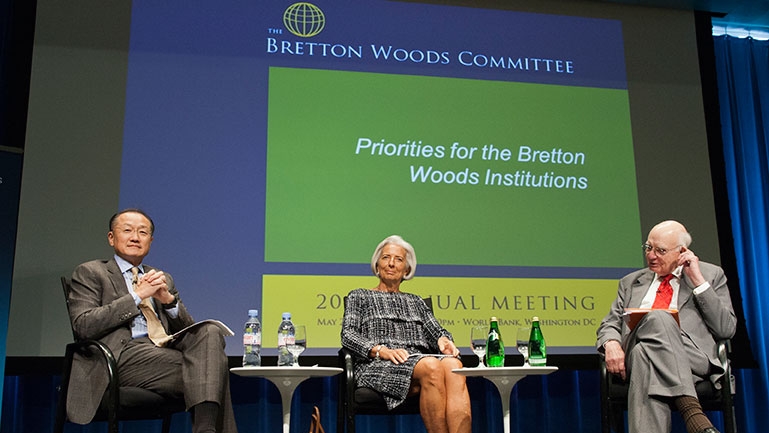At the annual meeting of the Bretton Woods Committee held at headquarters on Wednesday, President Jim Yong Kim said the Bank Group can find a way to help countries “leapfrog generations of mistakes” in health and education and other fields in order to help the poor and vulnerable.
Kim made the remarks in a session titled, “Priorities for the Bretton Woods Institutions,” during a conversation with IMF Managing Director Christine Lagarde, which was moderated by Paul Volcker, former chairman of the United States Federal Reserve. The conversation ranged from issues of income inequality to tapering by the Federal Reserve and how both the Bank Group and IMF will remain relevant in the future.
Kim talked about the ongoing change process at the Bank Group, saying that the job of the new Global Practices will be to find the “greatest innovations’’ in health, education, transport, trade and other sectors and spread that knowledge to countries and companies. The Bretton Woods Committee is a U.S.-based network organization made up of prominent citizens from around the world dedicated to fostering strong and effective Bretton Woods institutions.
Referencing Thomas Piketty’s popular new book Capital in the 21st Century, Kim noted the author mentions two major forces that have moved the world toward convergence: diffusion of knowledge and investment in skills. Kim said the Bank Group is looking at ways of supporting the context-specific initiatives that will lead to both growth and convergence.
Lagarde, in her opening remarks, talked about the importance of reform, and said that looking back at her three-year tenure of the Fund, the word “adapt” described much of the experience. She said her predecessor had been asked to downsize the Fund before the financial crisis hit. Despite this, Lagarde said they had to adapt and lend nearly $700 billion. The IMF currently has technical assistance missions in 150 out of 188 member countries, she said.
Kim gave much credit to his predecessor, Robert Zoellick, for his leadership at the Bank during the time of the financial crisis. “Bob did so much to steady the waters, and when the financial crisis hit, we played an effective role,” said Kim. From 2008-2011, “the focus was on the fire brigade, getting the money out of the door,” he said.
Kim said when he first came to the Bank in 2012 he faced questions of whether the institution was still relevant. People asked him what the Bank’s future would be in a world where African countries could get money from China and Nigeria was hiring consultant firms to help.
Moreover, he said knowledge often didn’t spread from one region to another—unless it was done through the personal efforts of individual staff.
Acknowledging pushback against change, Kim said that while it may seem an “exotic process” to some, it was “basic management 101,” including making budget choices based on the institution’s priorities, not on the previous year’s budget.
“You can talk about everyone’s budget but your own,” Kim said of the new budget negotiation process put to the test recently at the Bank. “And we vote on what our priorities should be—this is the first time this had been done.”
Kim said that the institution is also asking fundamental questions such as why it costs three times the amount to do something in one country than another. Changes at the Bank are also allowing IBRD lending to nearly double, and provide more flexibility, said Kim.
Asked by Volcker where the Fund had been before the crisis, Lagarde called the question of why they did not spot the looming trouble an obsession. Lagarde cited an IMF paper published before the crisis by the then chief economist which highlighted some of bubbling risks. But, she said, the paper had not been perceived as “critically important.”
“It has to do with the culture of the Fund, to be risk-averse,” she said, adding that this leads to a lack of tolerance towards lateral thinking and out of the box ideas. Lagarde mentioned the Fund is also undergoing some changes, and that the appointment for a replacement for the departing deputy managing director Nemat Shafik would not be a “behind doors deal in smoky rooms.”
Kim said that the Bank, too, had been critiqued for being risk-averse, with its layers of bureaucracy and tendency to move decision-making up the ladder.
In response to a question on the role of the private sector from Nicolas Mombrial, head of Oxfam’s Washington office, Kim said, “If you add up Africa and BRICs—which is a trillion a year in infrastructure needs—we can’t achieve these goals without the role of private sector.”

